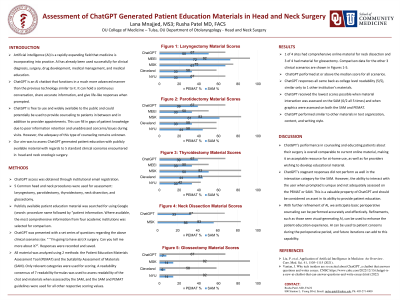Head and Neck Surgery
(377) Perioperative Counseling in Head and Neck Surgery via ChatGPT Chatbot
Monday, October 2, 2023
2:45 PM - 3:45 PM East Coast USA Time

- RP
Rusha J. Patel, MD
Associate Professor
University of Oklahoma Health Sciences Center
Oklahoma City, Oklahoma, United States - LM
Lana Mnajjed, MSIII
Student
University of Oklayoma
Broken Arrow, Oklahoma, United States
Presenting Author(s)
Disclosure(s):
Rusha J. Patel, MD: No relevant relationships to disclose.
Lana Mnajjed, MSIII: No relevant relationships to disclose.
Introduction: The growth of artificial intelligence (AI) has allowed for applications in medicine. ChatGPT, a chatbot software released by the company OpenAI, is the latest development in AI. This study utilized ChatGPT to provide perioperative counseling of patients undergoing head and neck surgery.
Methods: ChatGPT access was obtained through institutional email registration. Clinical scenarios were selected based on common clinical questions and triage messages posed by patients undergoing routine head and neck surgery. Scenarios were divided into those involving perioperative education and counseling, and those involving surgical complications and management. These were presented to ChatGPT using lay language from a patient point of view. Responses and recommendations were recorded and studied for inclusion of key points in education and management.
Results: 4 of each type of scenario were presented to ChatGPT. For scenarios involving a surgical complication, ChatGPT was able to direct the patient to assistance; however, the chatbot was unable to assess the severity of the complication or provide specific support. For scenarios involving perioperative guidance and education, ChatGPT responses covered key counseling points without additional prompting.
Conclusions: Recent advances in chatbot technology have allowed for 'human-like’ interfaces. Our study suggests that ChatGPT can be useful in the perioperative education of head and neck patients. Unlike internet search engines, ChatGPT aims for a conversational tone that is ideal for patient counseling. ChatGPT performed well in providing 'human-like' counseling for patients about their diagnosis and guiding them through surgery. ChatGPT did not perform as well with scenarios involving complications. As written, ChatGPT responses are based on predefined input and does not access the internet. Future chatbots may be designed with a larger and topic-specific resource library. With further refinement of AI technology, we anticipate AI chatbots can potentially be used as a ‘first-pass’ method of addressing patient concerns during the perioperative period.
